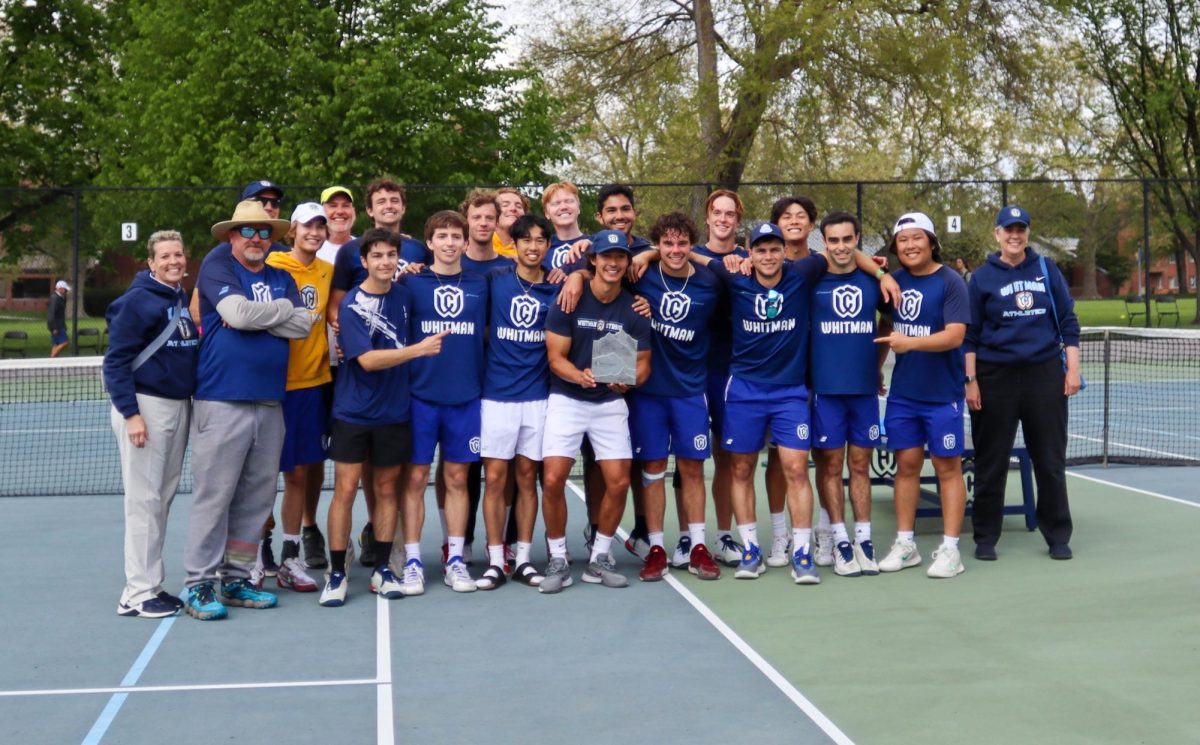Changes may be in the works for the Northwest Conference.
In the past two years, the NWC has turned its attention towards re-assessing the structure of each athletic season, specifically the potential addition of a conference championship tournament for soccer and baseball after changes were made to tennis.
Prior to the 2010-11 athletic season, six teams made the NWC championship tennis tournament, which was held every year at a neutral site in Yakima, Wash. In contrast, this season only four teams played in the conference championships, and the top-ranked team at the end of the regular season served as the host for the two-day tournament. This meant that on the men’s side, Whitman hosted the tournament as the number one seed; this change greatly enriched the experience for the team.
“[Hosting the conference tournament] was huge,” said men’s tennis coach Jeff Northam. “We had incredible support from the Whitman community and it helped fuel us to play our best. Honestly I think the visiting teams were a bit intimidated by having such a big crowd … Besides being an impact for the team, it was just plain old fun for us to play in front of a large rowdy crowd.”
Desire for a conference tournament has been expressed by soccer coaches on both the men’s and the women’s side. Currently, the conference champion is determined by the team with the best record at the end of the regular season; this team gets the NWC’s automatic bid to the NCAAs. The possibility of switching to having a conference tournament for soccer has emerged on and off over the last few years according to Athletics Director Dean Snider. The champion of that tournament would then get the automatic bid.
After every season, the coaches from each sport come together to discuss potential changes for the next season, and can submit proposals for approval from the NWC and the athletic directors. In order to make any conference-wide changes, a proposal must be approved by the NWC championships committee and the athletic directors from all nine schools.
“Our coaches’ groups and our various levels of governance in the conference are always looking at how to better our athletics in the conference,” said Snider. “What I’m in favor of is providing student athletes the best possible experience. I like the conference format in general because it keeps teams more engaged for longer.”
An end-of-season tournament allows the top four teams in the standings to play for the NWC’s qualifying bid to the NCAA national tournament. Having a championship tournament may also improve the NWC’s chances of sending multiple teams to the NCAAs.
“I believe that the positive side of the conference tournament is that is keeps the players committed to the season for longer because you have a chance to win the automatic bid without having to win the conference outright,” said women’s soccer coach Heather Cato. “A tournament allows for the possibility of more than one team from the conference going to the NCAA tournament.”
The NWC soccer coaches are currently in the process of performing a financial evaluation, per the request of the conference championships committee, to analyze what the conference would gain or lose financially with the addition of a conference championship tournament. One speed bump that men’s and women’s soccer faces is the fact that the NWC fall sports season is only 10 weeks long, so the addition of a conference tournament would cut a week of regular season games out of the schedule. Moving the conference season up a week is not possible because the NCAA has an official start date for Division III competition.
“There are geographical issues, there are cost issues,” said Snider. “If you lose a week of competition and only have four teams that make a [conference championship] tournament, there are five teams filled with student athletes who are losing the opportunity to compete.”
“The downside of a tournament for the NWC is location of the ‘Whits’ and minimal DIII schools in the northwest area,” said Cato. “The tournament designed is to play less conference games in order to allow for the tournament within the regular season. This would mean that we would have to fly for non-conference games or play non-DIII programs, which doesn’t help our national rankings. In order to make it worth it, we would have to attempt to play DIII schools from all over the country, and these additional non-conference game would put a huge strain on the overall budget. Therefore, I would have to vote no for a tournament until it is formatted in a way that we would not lose four to six DIII games in the area or add further budget issues.”
There are several potential changes in the coming years for the NWC, and, no matter what happens, the goal of the conference and all its schools is to maintain a high level of competition and to provide a positive athletic experience for its student athletes.
“I’m in favor of great experiences for student athletes,” said Snider. “Anyway we can best serve that end is what we want to do.”
Change may or may not happen. The bottom line is that the NWC, along with its coaches and student athletes, are all looking for the best experience possible.


